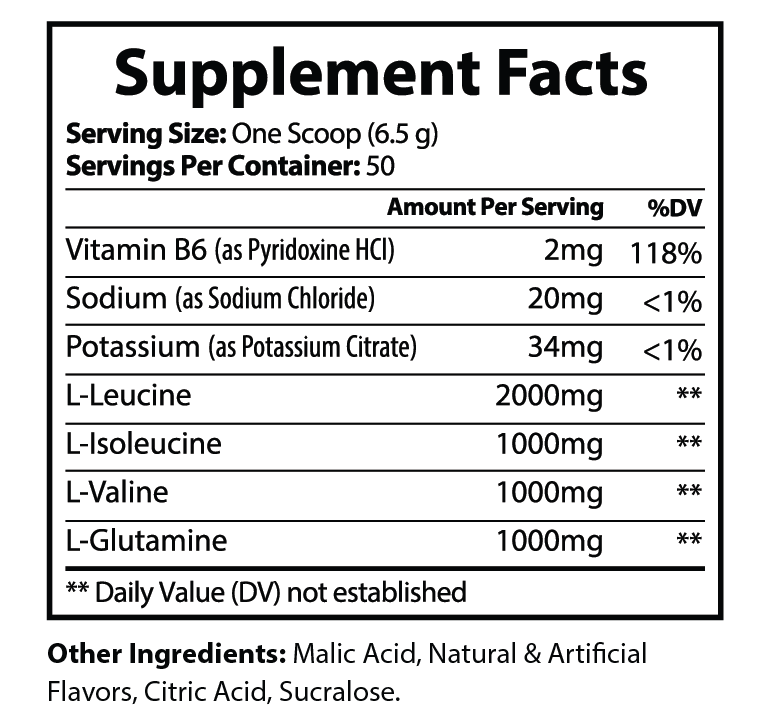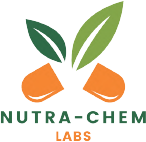- Description
- Key Ingredients & Benefits
- Usage & Directions
- Quality Standards
- Warnings
- Sources
NC-FORCE BCAA Lemon Lime is a powerful blend of 5g of Branched-Chain Amino Acids (BCAA) and Glutamine, designed to boost muscle growth, enhance recovery, and prevent muscle breakdown. This formula includes Vitamin B6 for improved BCAA absorption, ensuring you get the most out of every workout.
- Promotes muscle growth and enhances protein synthesis
- Prevents muscle breakdown during intense workouts
- Supports immunity, gut health, and overall recovery
- Boosts exercise performance and endurance
BCAA (2:1:1 Ratio): A precise blend of Leucine, Isoleucine, and Valine to support muscle growth, prevent tissue breakdown, and improve recovery. Leucine, in particular, activates muscle protein synthesis even during calorie deficits.
L-Glutamine: Enhances immune function, speeds up recovery, and promotes gut health.
Vitamin B6: Essential for energy production, blood sugar regulation, and overall cardiovascular and metabolic health.
Mix 1/2 scoop (6.5g) in 8-10 oz of cold water. Best taken pre-workout, post-workout, or between meals for optimal results.
- High-Quality Ingredients: Third-party tested, made in the USA, and produced in an FDA-registered, GMP-certified facility.
-*These statements have not been evaluated by the Food and Drug Administration. This product is not intended to diagnose, treat, cure, or prevent any disease. -Tamper Seal: Use only if the seal is intact. Consult your health care practitioner if you are pregnant or nursing, taking medications, or have a medical condition, before taking this or any other product. -Store in a cool, dry place. Keep out of reach of children.
18. Cruzat, V., Macedo Rogero, M., Noel Keane, K., Curi, R., & Newsholme, P. (2018). Glutamine: Metabolism and Immune Function, Supplementation and Clinical Translation. Nutrients , 10 (11), 1564. https://doi.org/10.3390/nu10111564
38. Ueland, P. M., McCann, A., Midttun, Ø., & Ulvik, A. (2017). Inflammation, vitamin B6 and related pathways. Molecular aspects of medicine , 53 , 10–27. https://doi.org/10.1016/j.mam.2016.08.001
39. Bird R. P. (2018). The Emerging Role of Vitamin B6 in Inflammation and Carcinogenesis. Advances in food and nutrition research , 83 , 151–194. https://doi.org/10.1016/bs.afnr.2017.11.004
40. Mascolo, E., & Vernì, F. (2020). Vitamin B6 and Diabetes: Relationship and Molecular Mechanisms. International journal of molecular sciences , 21 (10), 3669. https://doi.org/10.3390/ijms21103669
41. Nie, C., He, T., Zhang, W., Zhang, G., & Ma, X. (2018). Branched Chain Amino Acids: Beyond Nutrition Metabolism. International journal of molecular sciences , 19 (4), 954. https://doi.org/10.3390/ijms19040954
42. Fan, P., Li, L., Rezaei, A., Eslamfam, S., Che, D., & Ma, X. (2015). Metabolites of Dietary Protein and Peptides by Intestinal Microbes and their Impacts on Gut. Current protein & peptide science , 16 (7), 646–654. https://doi.org/10.2174/1389203716666150630133657




